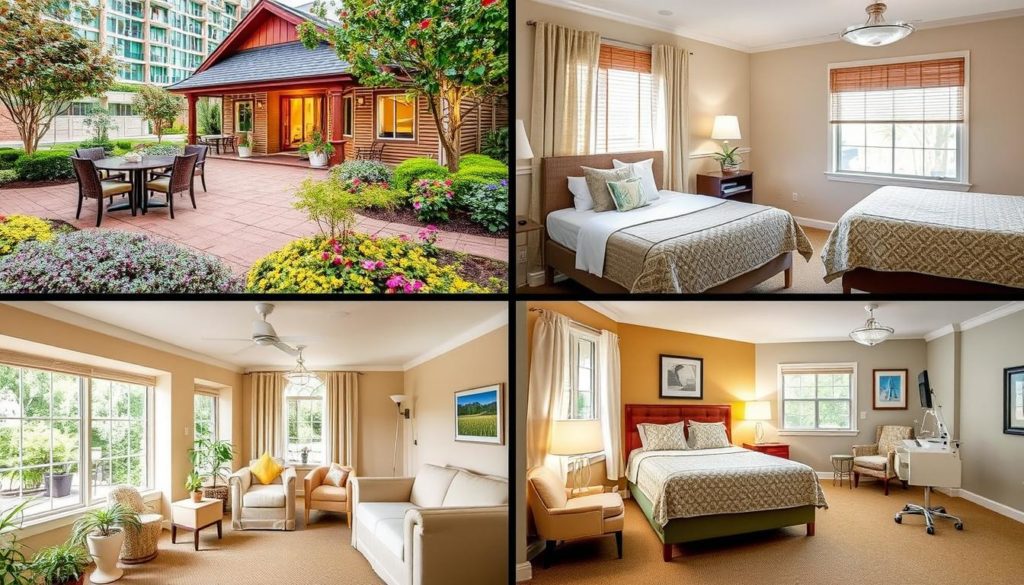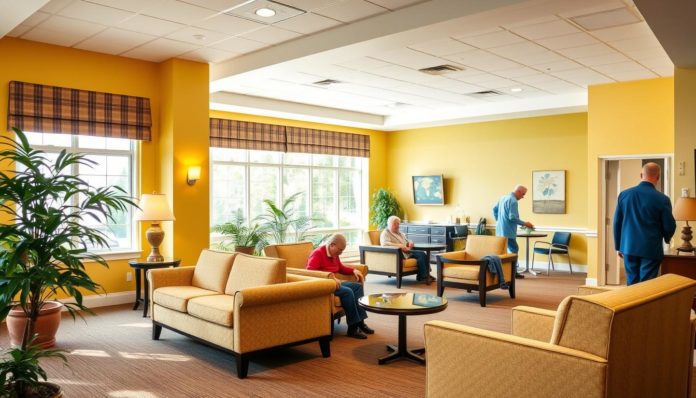Nearly 6 million Americans live with Alzheimer’s. This number might jump to 14 million by 2060. The need for specialized Alzheimer’s Care Facilities and Dementia Care Services is growing fast.
Choosing a long-term care facility for a loved one is tough but often needed. These places offer the right care, keep them safe, and provide medical support. Senior Care for Alzheimer’s Patients changes as the disease gets worse. They offer everything from living on their own to having someone help them all day.
Knowing about the different types of care helps families make good choices. This guide will help you understand long-term care options for Alzheimer’s patients better.
Understanding Alzheimer’s and Long-Term Care
When we look at long-term care for those with Alzheimer’s, we need to understand the disease itself. Specialized care is often crucial for these patients.
What is Alzheimer’s Disease?
Alzheimer’s Disease is a type of dementia. It greatly affects memory, thinking, and social abilities. These changes heavily impact daily life.
The condition gets worse over time. It disrupts more than just memory, affecting thinking skills and everyday tasks. As symptoms progress, the need for more help grows.

Why Long-Term Care is Necessary
In the later stages of Alzheimer’s, round-the-clock care becomes vital. Patients need help with their daily tasks. Safety measures, health management, easing caregiver stress, and social activities are key reasons for this care.
Memory Care Homes offer a setting designed for Alzheimer’s patients. They provide the needed care and help improve life quality.
Types of Alzheimer’s Care Facilities
Finding the right place for someone with Alzheimer’s is important. It helps to know about the options. This includes Alzheimer’s Assisted Living, Nursing Home Care, and Specialized Programs.

Assisted Living Facilities
Assisted living is good for early to mid-stages of the disease. These places offer housing, meals, and help with healthcare. They are perfect for those who still want some independence.
Residents enjoy social events and get help with daily tasks. This way, they keep some freedom and get the care they need.
Nursing Homes
Nursing homes cater to those who need help all the time. This is especially for those in the advanced stages of dementia. They provide all-round care like nutrition and medical services.
The staff is trained for dementia care challenges. These places follow strict rules to make sure they offer great care.
Memory Care Homes
Memory care homes are for Alzheimer’s and dementia patients. They offer programs made just for these conditions. These places are safe and easy to get around in, reducing confusion.
The staff knows a lot about caring for dementia patients. They make sure residents get caring and effective support.
Long-Term Care for Alzheimer’s
Planning long-term care for Alzheimer’s patients means looking at every stage of dementia. It’s about finding the right support, from caregivers at home to residential care facilities. These options help provide continuous care.
Safety and medical needs are key in choosing care. Moving to an Alzheimer’s care facility should keep patients safe and respect their dignity. For many, senior care for Alzheimer’s patients involves assisted living or memory care homes.
When deciding on care, think about:
- The level of personalized dementia care offered
- The skills and professionalism of caregivers
- Whether the facility feels welcoming
Families should aim for care that meets both medical and emotional needs. Keeping families involved helps make the transition smoother. This creates a supportive setting where loved ones can thrive.
Choosing the Right Alzheimer’s Care Facility
Finding the right Alzheimer’s care facility takes careful thought. It starts by understanding the patient’s current and future needs. This ensures the facility provides comprehensive Dementia Care Services.
Evaluating Care Needs
To assess care needs, look at the level of Alzheimer’s and any behavior issues. Families should look at:
- The level of personal care needed
- Current and future health conditions
- Behavioral management and support services
Understanding these factors helps choose a place with the right Alzheimer’s Caregiving Support.
Questions to Ask Potential Facilities
When visiting Memory Care Homes, asking key questions is vital. Important questions include:
- What are the staff-to-resident ratios?
- What kind of training do the staff get in Dementia Care Services?
- How are care plans made and updated?
- What activities are there for residents?
- What does the facility cost?
Looking into these points helps understand if a facility matches the family’s and patient’s needs.
| Evaluation Criteria | Importance | Questions to Ask |
|---|---|---|
| Staff Training | High | What dementia-specific training is provided? |
| Activities Schedule | Medium | What activities are planned for cognitive engagement? |
| Care Plans | High | How are individual care plans managed? |
| Cost Structure | Medium | What are the costs and what do they include? |
Costs and Financial Planning
Looking into Alzheimer’s care requires knowing about different costs. These costs can change a lot based on care level, where it’s located, and extra things the place offers. Planning your money right can make dealing with these costs easier.
Understanding Cost Structures
Alzheimer’s care places usually charge for staying there, medical care, and special care for those with dementia. They might have extra things to do and programs for staying healthy, which can change the total price. It’s important for families to look at these expenses carefully to plan their money well.
- Room and Board: Basic accommodation, utilities, and meals.
- Medical Treatments: Regular medical check-ups, medications, and emergency care.
- Specialized Care: Support for behavioral issues and routine tasks.
- Amenities: Recreational and wellness activities.
Medicaid and Medicare Options
Knowing about Medicaid for long-term care and Medicare options is key in financial planning for dementia care. Medicare mainly covers medical services, while Medicaid can cover more, especially for those who qualify by income and other things. Talking to lawyers who know about elderly care can help in using these programs well.
| Program | Services Covered | Eligibility |
|---|---|---|
| Medicare | Medical services, such as doctor visits and hospital care | Primarily for those aged 65 and older or individuals with disabilities |
| Medicaid | Long-term care, including room and board in a care facility | Income-based eligibility requirements |
Personalized Dementia Care: Tailoring to Individual Needs
Alzheimer’s patients get a lot from care that understands their history and skills. Custom care plans make daily routines respectful and interesting. This tailored method works well in Memory Care Homes, keeping purpose alive with flexible routines and special activities.
Facilities with special Alzheimer’s care programs have unique features for comfort and pride. Tailored activities help residents stay involved and boost their confidence. This improves their overall happiness.
The main aim of personalized dementia care is creating a caring space where patients feel important. It includes familiar routines and loved activities, which boosts life quality. With focus on personal plans, these facilities offer care that changes as each resident’s needs do.
Key parts of this approach include:
- Custom daily routines
- Respectful interactions
- Specialized activities
- Comforting living spaces
Personalized care helps keep a resident’s skills and promotes dignity with caring interactions. Picking a place that values these things can greatly help Alzheimer’s patients and their families.
Support for Alzheimer’s Caregivers
Caring for someone with Alzheimer’s is tough. It brings emotional and practical challenges. Finding the right support is key to managing these issues well.
Emotional Support and Counseling
Support for Alzheimer’s caregivers begins with focusing on their emotional health. Counseling offers a place to share feelings and frustrations safely. Talking to professionals helps caregivers deal with their complex feelings.
Emotional support groups, both face-to-face and online, share experiences and advice. These groups help caregivers feel understood and offer practical tips.
Community and Online Resources
Online resources are very helpful for Alzheimer’s care. Sites like ALZConnected allow caregivers to talk with others, offering support and understanding. These online platforms share helpful tips and knowledge.
Local support through organizations and social services also helps reduce caregiver stress. They offer respite care, educational materials, and workshops. These tools help caregivers give the best care possible.
Day-to-Day Life in Alzheimer’s Care Facilities
Alzheimer’s care facilities offer a stable, comfortable, and engaging daily life for residents. They create personalized care plans for everyone, respecting their unique needs. These facilities provide meals, activities, and medical care to meet the diverse needs of Alzheimer’s patients.
Designed activities at these facilities help residents build social connections and improve their life quality. They include exercise, cognitive therapy, and nutrition-focused meals. Personal care services make residents feel valued. Some also have special programs for different stages of Alzheimer’s.
Adult day centers are a relief for caregivers, offering a safe place for the elderly. They provide counseling, health services, and therapy for Alzheimer’s and dementia. For more details on these centers, visit the Alzheimer’s Association. Knowing about these facilities helps families make informed choices for their loved ones’ dementia care, ensuring a secure and fulfilling life.
FAQ
What is Alzheimer’s Disease?
Why is Long-Term Care Necessary for Alzheimer’s Patients?
Alzheimer’s patients often need long-term care. This is especially true when they can’t be left alone safely. Things like health, safety, and the need for regular social activity make long-term care vital.
What are Assisted Living Facilities?
Assisted Living Facilities are a support for people who can’t live alone. They offer housing, food, and help with daily activities. They are somewhere between living at home and being in a full-care nursing home.
What Do Nursing Homes Provide?
Nursing Homes offer around-the-clock care. They provide meals, activities, and medical support. These homes follow strict rules and are run by trained professionals, ready for various health issues.
What Are Memory Care Homes?
Memory Care Homes are special places for people with dementia. They have safe layouts and staff trained in dementia care. This creates a supportive environment for their residents.
How Can I Evaluate Care Needs for an Alzheimer’s Patient?
To evaluate care needs, look at the personal care a person needs, how severe their dementia is, and any difficult behaviors. Plan not just for now but as the illness gets worse.
What Questions Should I Ask When Visiting Potential Facilities?
When looking at facilities, ask about how the staff is trained and the care routines. Find out about activities, costs, and how much personal attention is given. Talking to staff and other families helps too.
What are the Cost Structures for Alzheimer’s Care Facilities?
The cost of Alzheimer’s care varies. It includes room, care, and other services. Understand the differences between private pay and what insurance or Medicaid covers. Talking to a lawyer about money planning can help.
How Do Medicare and Medicaid Help with Long-Term Care Costs?
Medicare and Medicaid help pay for care in different ways. Medicare covers short-term care while Medicaid may cover more, depending on who is eligible. Knowing your options helps with money management.
What is Personalized Dementia Care?
Personalized Dementia Care means plans that fit the individual. They respect the person’s past, likes, and what they can do. It’s about having a daily routine that feels right and keeps dignity.
How Can Caregivers Find Emotional Support?
Caregivers find support through counseling, support groups, and online. Places like the ALZConnected community offer a space to talk, find advice, and share stories with others in the same boat.
What Community and Online Resources Are Available for Alzheimer’s Caregivers?
Many resources help caregivers of those with Alzheimer’s. The Alzheimer’s Association website is a great place to start. It offers information and forums where caregivers can connect and support each other.
What is Daily Life Like in Alzheimer’s Care Facilities?
In Alzheimer’s care facilities, every day is about comfort, routine, and engaging activities. There are personalized care schedules, special activities, meals, and healthcare. All to make life better for the residents.


